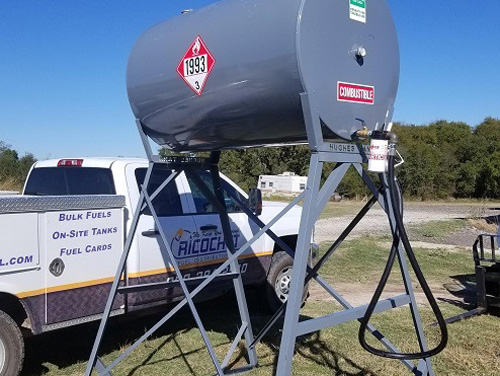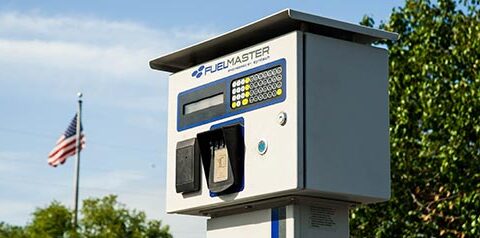Ricochet’s Guide to Bulk Fuel Storage: Methods, Costs and Safety Regulation

On-site bulk fuel storage is a well-documented strategy for improving productivity and managing costs for businesses that operate fleets or heavy equipment. However, make no mistake, a smart decision to invest in fuel storage tanks is more than simply ordering a tank; it involves knowing the entire continuum of costs, risks, and the technology that distinguishes a simple storage solution from a strategic asset.
A contemporary fuel storage system is supposed to be safe, compliant, and efficient. This guide aims to clarify several important considerations that we help broker in a discussion, from understanding the daily risks that need to be managed to understanding the sophisticated technology and features that help protect your investment and optimize your meter for efficiency.
Understanding the True Costs of Your Fuel System
The most significant cost of on-site storage is the cost of the tank itself. Although it is a purchase option, many businesses like to take advantage of a rental program. As an example, Ricochet Fuel can usually provide a decent tank for your site at no cost to you, assuming you meet some minimum monthly fuel purchase requirements, thereby eliminating the largest out-of-pocket cost.
The “real” cost is in long-term reliability. A good supplier will provide you with a tank that will be structurally sound and will have been well-maintained. This is crucial because a large part of investing in quality equipment is in avoiding the hidden, long-term costs associated with maintenance issues, fuel degradation, and large leaks.
Managing Key Risks
An onsite fuel supply is a valuable asset, and understanding how to store fuel safely involves protecting it from all potential risks. Physical security is your first defense against fuel theft, and some simple ideas are effective:
- Make sure security lighting is present in the tank area.
- Cameras should be positioned and working.
- New pumps with secure keypads give you information on who uses the tank, with a record of time used.
- Place the tank in an open, visible location but still secured within a fence.
In addition to theft, the next biggest risk is an environmental spill. While physical security is a barrier, technology will protect you the most. When speaking to your supplier about tanks, ask if they offer tanks with built-in leak detection. These tanks will give you continuous monitoring and alert you to an issue prior to it becoming an expensive environmental issue, which is invaluable.
Methods of Bulk Fuel Storage
- Choosing the right tank setup is crucial for efficiency and site management.
- The primary methods of bulk fuel storage include above-ground, underground, and mobile options.
- Above-ground tanks are the most common, and the benefits of above ground fuel tank operation include ease of inspection, maintenance, and relocation.
- For sites with limited space, underground fuel storage tanks are an excellent choice as they are protected from damage and temperature changes.
- Finally, mobile fuel tanks offer unmatched flexibility for industries like construction that require fuel at multiple job sites.
Safety and Compliance Standards
Navigating fuel tank safety regulations is mandatory. If you operate any business within the United States, there are at least two standards the operation must comply with:
- The EPA SPCC Rule – This holds your business to a site-specific plan to prevent and respond to fuel spills.
- The UL142 Standard – This means that your above-ground steel tank has been designed and tested to adhere to the highest levels of safety and performance.
Better-than-generic tanks will also comply with worldwide standards like BS799 (British) and AS1940 (Australia). In general, the factions that create them use internationally compliant ISO standards for ventilation (see ISO 28300) and internal lining (see ISO 16961). Quality suppliers like Ricochet understand the significance of supplying equipment that should meet or exceed the highest levels of safety.
Advantages of a Modern Fuel System
The advantages of on-site fueling extend way beyond just convenience. If managed properly, an on-site fueling system will provide great returns for your business.
- Control: You’ll have total control and visibility over your fuel consumption to help eliminate waste and curb theft.
- Efficiency: your fleet and machinery can operate without unnecessary trips to the gas station that take time and ultimately and ultimately cost money.
- Lower Costs: You will be purchasing at bulk prices and can purchase fuel when market prices are more favorable.
Better Data Management is the best system out there now, will seamlessly integrate with online fuel management systems to provide real, live, and transparent data about fuel levels and usage, allowing you to maximize efficiency and make fuel supply an optimized part of your operations.
With the Final Thought
Fuel storage on your site is a wise investment that provides you with ongoing daily savings and efficiency. The first key to success is finding the right partner, someone who not only shows up on time with your fuel but who also provides solid, compliant equipment with a good track record.
Ricochet Fuel has been your trusted partner for more than 30 years with businesses across Texas and beyond. We handle everything from assisting you with a tank to making sure your fuel supply is there when you need it.
Contact Ricochet Fuel Distributor today to discuss a comprehensive and cost-effective fuel solution for your business.


